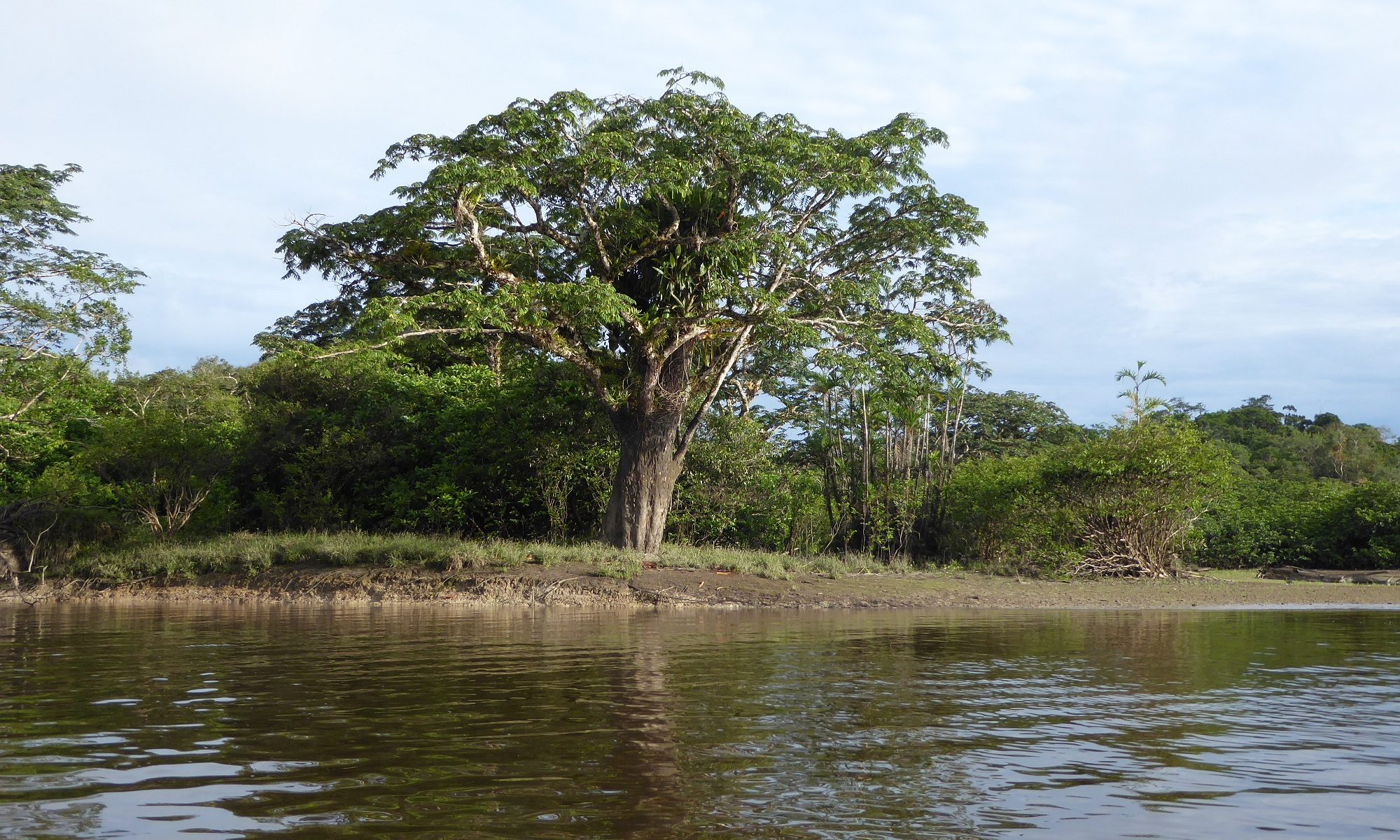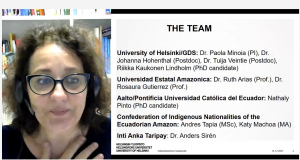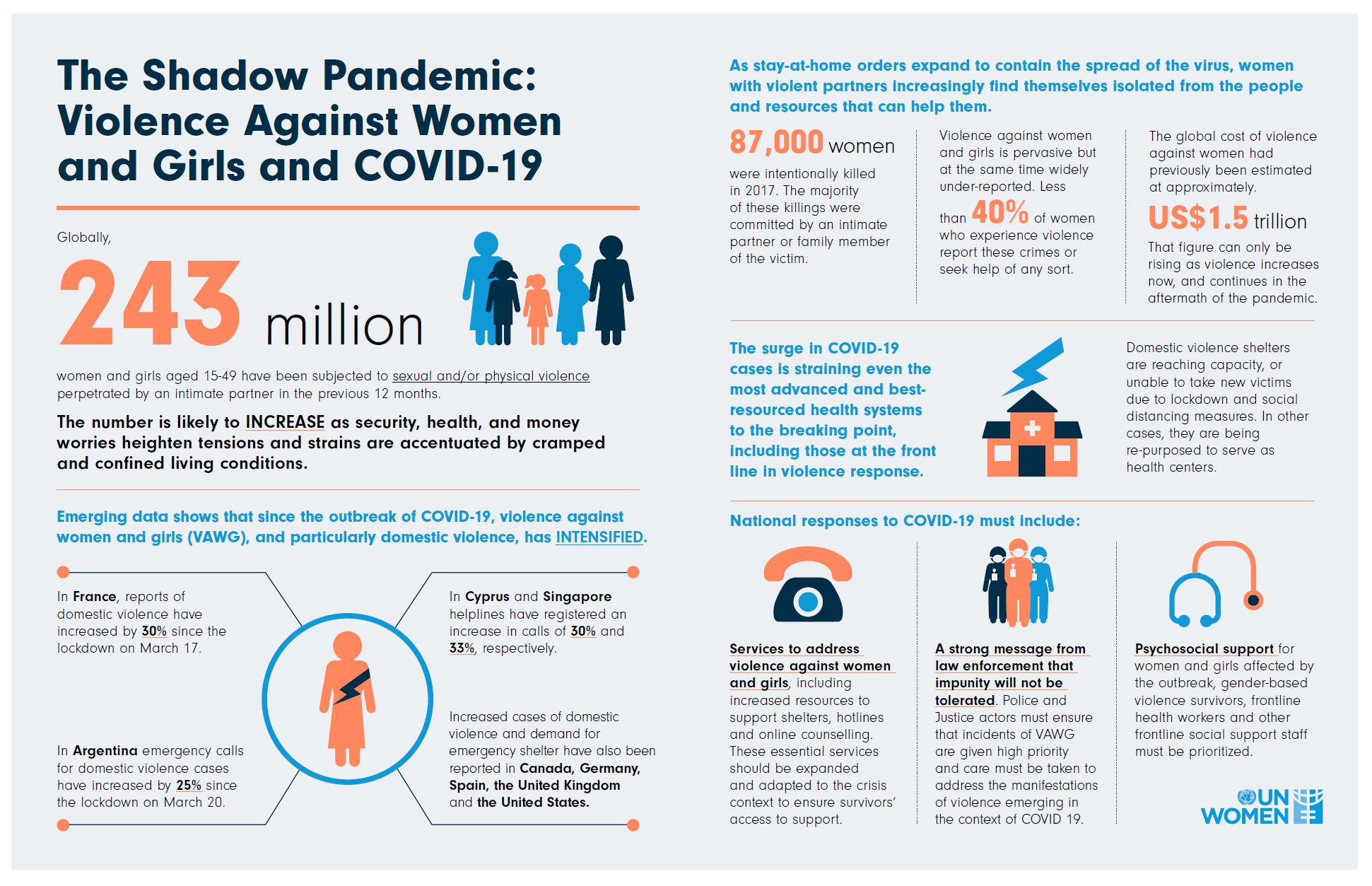We published the book Plurinacionalidad y Justicia Epistémica, with Abya Yala (edited by Ruth Arias-Gutiérrez and Paola Minoia), and a Special Issue titled “Education and socio-environmental justice in the pluriverse” (edited by Paola Minoia and José Castro-Sotomayor) is forthcoming in the journal Globalizations.
Moreover, here are some articles and a book chapter that have been published, with the links to read them online:
– Arias-Gutiérrez, R. I., & Minoia, P. (2023). Decoloniality and critical interculturality in higher education: experiences and challenges in Ecuadorian Amazonia. Forum for Development Studies, 50(1), 11-34. https://doi.org/10.1080/08039410.2023.2177562
– Castro-Sotomayor, J., & Minoia, P. (2023). Cultivating postdevelopment from pluriversal transitions and radical spaces of engagement. In H. Melber, U. Kothari, L. Camfield, & K. Biekart (Eds.), Challenging global development: towards decoloniality and justice (pp. 95-116). (EADI Global Development Series ). Palgrave Macmillan. https://doi.org/10.1007/978-3-031-30308-1_6
– Minoia, P., Tapia, A., & Kaukonen Lindholm, R. E. (2024). Epistemic territories of kawsak sacha (living forest): cosmopolitics and cosmoeducation. Globalizations. https://doi.org/10.1080/14747731.2024.2308332
Academy of Finland’s Programme for Development Research: Webinar on Tuesday 14 December at 10.00–15.30
We have participated in the Webinar organized by the Academy of Finland in cooperation with the Finnish Ministry of Foreign Affairs. We have presented our team and project location, and then the research focus, methodology and preliminary findings. Here below I report some excerpts from the presentation, but first of all, I have acknowledged all research collaborators. Their names are in the following slide.
“The theme of our research project is located at the intersection between the accomplishment of the right to education for all, as stated by the SDG4, and the right to pertinent education, as stated by the United Nations Declaration on the Rights for Indigenous Peoples of 2007. In a country that is Plurinational by Constitution, Education contributes significantly to reinforcing political emancipation and territorial self-determination of indigenous peoples. This intersection has been articulated through programmes of Intercultural Bilingual Education (IBE). For indigenous students, IBE means to support emancipatory pathways via revitalization of traditional languages, land-based knowledges, and philosophies of life that respect humans and non-humans in nature. These components form a whole that can maintain their identities against rural-urban migration and assimilation into the urban-Hispanic hegemonic culture. Intercultural education is an education that can represent a way for young indigenous people to exit marginalization and poverty, not as individuals but within their own communities and indigenous nationalities. The preservation of indigenous communities on their lands can guarantee protection of ecological diversity against land use changes, and especially deforestation and extractive mining that cause environmental and climate changes.
In methodological terms, we looked at different policies of education and their contingent impacts in terms of access, pedagogies and results, through different tools. The research methodology has been mainly qualitative and we have used interviews, walking interviews, focus groups, mapping, and projects of caring through design in times of Covid-19.
Some of the research foci have been:
- Analysis of policies, conflicts and negotiations on education between State ministries and indigenous organizations; considering that in some cases, they were not alone but closely linked to negotiations for territorial rights and environmental planning. Examples are Planes de Vida (life plans) of the kichwas that see students as important agents.
- Analysis with statistics on schooling of indigenous and rural peoples in Pastaza; and statistics of students of the Universidad Estatal Amazonica (UEA) that self-identify as members of indigenous nationalities. There has been an increase of students who identify as Indigenous at the national level and in the UEA in the past years. The work has also provided an analysis of the problems in the transition between secondary and tertiary education, and between school and work related to the acquired education.
- Analysis of school topics and their reference to environmental sustainability; and of educational materials and pedagogies that have been used with the aim to revitalize indigenous knowledge, onto-epistemic plurality and inter-generational learning.
- Analysis of home-school mobility and school accessibility, especially considering some recent turbulences (or challenges) posed by the Organic Law on Education, by strikes, and by Covid-19: showing the importance to integrate socio-cultural, territorial and mobility justice perspectives into the global agenda of quality education, and also looking at the importance of the envirionmental and territorial engagement of students who attend schooling in their communities. .
- Accessibility has also been studied in terms of digital divide especially during the Covid-19 that has exacerbated educational inequalities, to which the state response has been weak. The UEA has self-organised distribution of laptops and gigabites thanks to other private funding. A subproject has build networks of information and care between the UEA and student of the Pontificia Universidad Catholica del Ecuador.
Until 30.12.21 you can watch the replay from the webinar here. The presentation of our project starts at the 1:45′.
Educational emergency in the Shuar territory
Text: Tuija Veintie, Photo: Comunicación Confeniae
The Federation of the Shuar Nationality of Pastaza (FENASH-P) declared a state of emergency in education.

On 20 January 2021, the FENASH-P organized an emergency assembly to discuss and bring forward the untenable educational situation in the Shuar territory. The event gathered together people from 34 Shuar communities in Pastaza.
The Shuar Federation together with the Confederation of Indigenous Nationalities of Ecuador (CONAIE) and Confederation of Indigenous Nationalities of the Ecuadorian Amazonian (CONFENIAE) state that intercultural bilingual schools in the Shuar territory in Pastaza lack adequate infrastructure, educational materials and even teachers, and the pandemic has seriously aggravated the educational inequality. The emergency assembly set an agenda for the necessary improvements in education in the Shuar territory: Continue reading “Educational emergency in the Shuar territory”
Educational situation in the Amazon at the start of the year
Text: Nathaly Pinto
The year started with immense worries regarding the current situation of students in the amazon region. Marlon Vargas, president of the Confederation of Indigenous Nationalities of the Ecuadorian Amazonian (CONFENIAE) expressed:
The organization is deeply concerned about the situation of education of the peoples and nationalities of Ecuador, as well as the peasant and proletarian sectors of the country for whom the right to education has become a privilege by not being able to access.
In a public declaration, shared on January 8, 2021 CONFENIAE’s anticipating the International Day of Education (an annual international observance day dedicated to education), Vargas highlighted how by prioritizing virtual education in the context of COVID–19, the Ministry of Education excluded indigenous girls, boys and teenagers from education, by ignoring the amazonic geographical contexts, lack of proper infrastructure and social inequities in the region.
Continue reading “Educational situation in the Amazon at the start of the year”
Current issues on gender-based violence and discrimination – reports from Ecuador and the world
Text: Tuija Veintie
International Day for the Elimination of Violence against Women on 25th of November reminds about the worldwide problem of gender-based violence. Women and girls are particularly at risk of experiencing violence in times of social and economic crisis. This year, the outbreak of the COVID-19 pandemic has threatened the health and well-being of people around the world, deepening social and economic inequalities, exacerbating poverty. At the same time, violence against women and girls, and particularly domestic violence, has intensified globally, according to the United Nations (UN, 2020).
Also in Ecuador, domestic violence against women and girls has been increasing during the pandemic. Among others, Indigenous women living in the outskirts of big cities and in rural communities run a particular risk of experiencing violence due to their vulnerable socio-economic situation (Sacha Samay, 2020). Moreover, recent reports bring forward many other forms of violence that Indigenous women experience at the same time when they carry a heavy load of unpaid and unacknowledged care work in their families. In a declaration released in commemoration of the International Day for the Elimination of Violence against Women, the women representing the Confederation of Indigenous Nationalities of Ecuador (CONAIE) highlight the multiple forms of violence that Indigenous and rural women experience:
“as physical and sexual violence that many times ends up in femicide; as economic violence when our work is not valued and we do not have the necessary conditions to make the land produce and to commercialize our products; we live the obstetric violence when the medical system abuses us without understanding on our cosmovision; we live symbolic violence when we are discriminated for being Indigenous, and for living in rural areas; the violence is also present in our territories when invaded by the military forces and when destroyed or contaminated with mining, petroleum, and monoculture farming; we live political violence when we are prevented from holding public positions.” (CONAIE, 2020a. Translation from Spanish by author). Continue reading “Current issues on gender-based violence and discrimination – reports from Ecuador and the world”
Covid-19: its consequences in the Ecuadorian Amazonian Region and the right to education
Conversation with Dra. Ruth Arias, Rector of the Universidad Estatal Amazonica.
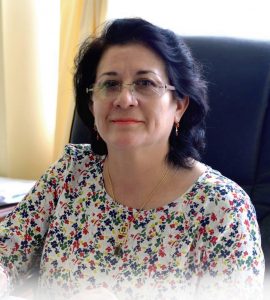
Paola: How is the situation, Ruth?
Ruth: We have been in quarantine since March 17, when the public emergency was declared. I could sense panic in the population from people’s behaviour, as socioeconomic differences are deepened and plenty of defiances is evident; there also are signs of solidarity and reflection. I think Boaventura de Sousa Santos’s writing, “The vulnerable and discriminated against in the South”, and Silvia Ribeiro from the ETC group, have very good analyzes of the situation many are experiencing.
Continue reading “Covid-19: its consequences in the Ecuadorian Amazonian Region and the right to education”
Flooding emergency in Indigenous communities by the Bobonaza river
Text: Tuija Veintie
[Haz clic aquí para version en Español]
Heavy rains increased discharge in the Bobonaza, Pastaza and Arajuno rivers in the Ecuadorian Amazonia, triggering flooding along the rivers. Affected communities include Jatun Molino, Teresa Mama, Chapeton, Montalvo, Wituk, Arajuno, and the most severely affected areas of Sarayaku and Pakayaku.
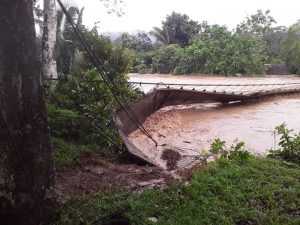
In the Indigenous Kichwa community of Sarayaku, river flows in the Bobonaza and its tributaries, Kali-Kali and Sarayakillu, rose rapidly on Tuesday, 17th of March, causing serious damage to infrastructure. The community of Sarayaku is in a state of emergency and reports that flooding has damaged people’s homes, schools, the community health center, as well as the main bridges and trails connecting different parts of the community. The airstrip, that connects the community to the nearest towns and hospitals, is shattered. In addition, flooding has damaged fresh water pipelines, crops and livestock. (Consejo de Gobierno de Sarayaku-Tayjasaruta, 18 March 2020).
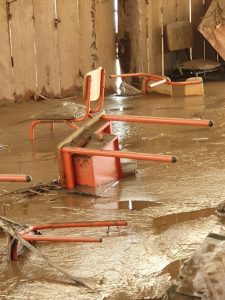
Situation in the Kichwa community of Pakayaku, also by the Bobonaza river, is equally alarming. According to the confederation of the Indigenous nationalities of the Ecuadorian Amazonia (CONFENIAE), in Pakayaku, three bridges were wiped out, dozens of families lost their homes and crops, and the infrastructure that provides fresh water to the community suffered damage. (Comunicación CONFENIAE, 18 March 2020).
Continue reading “Flooding emergency in Indigenous communities by the Bobonaza river”
Podcast on Eco-cultural pluralism, Extractivism, and the Kichwa people of Ecuadorian Amazonia
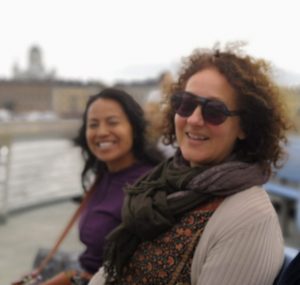
Paola Minoia: “Together with Katy,
I have been interviewed by the Podcast series on Extractivism and Alternatives.” The series is part of different initiatives coordinated within the unit of Development Study of the university of Helsinki, among which the forthcoming Exalt Conference 2020 on “Concurrent crises and sustainable futures: global extractivism and alternatives” in October 2020.
“In this podcast, we talked about the project, how Katy and I met and started our collaboration, and why we think that intercultural knowledge is related to different forms of justice: from epistemic to environmental and territorial. Katy spoke of her lived experiences in the Ecuadorian Amazon and, in particular, of evictions and destruction of villages in the Nankints community due to new mining exploitations.”
The podcast is accessible through this link. There are three versions: one integral version including presentations in Spanish by Katy and translations by Paola, one in Spanish, and one in English only.
“I hope you enjoy this conversation, and please let us know what you think!”
Discussing intercultural education, politics and activism
In January, members of our research group were actively participating in discussions about intercultural education, politics and activism in two public events organized at the University of Helsinki.
At the Night of Science, the annual block party for science and research, Tuija Veintie and Johanna Hohenthal gave a public talk on intercultural education and the “good life” in the Ecuadorian Amazonia. The talk provided an overview of the intercultural bilingual education in Ecuador and politics of good life (Buen vivir). The former Ecuadorian government promoted the politics of good life, including plurinationality, interculturality and quality education, but at the

same time the education policy reforms led to a decrease in Indigenous self-determination with regard to their educational system, as well as to diminishing number of schools and educational institutes providing instruction in Indigenous languages and respecting Indigenous knowledges and perspectives.
Continue reading “Discussing intercultural education, politics and activism”
In solidarity with the Ecuadorian people
(Español abajo)
We express our solidarity to all people of Ecuador that are currently suffering for the heavy situation initiated with the package of IMF policies rolled out by Lenin Moreno’s administration. Too many social groups from the low and medium classes will suffer from these policies with further poverty increase, and we understand why they cannot accept them. Unfortunately, the government has not shown any willingness to retract the package and undemocratically, has refused the dialogue with the parties. Instead, the government has responded with the state of exception, after which, the protesters have been met with violent repression and curfew measures. Military forces have entered “peace zones”, targeting especially indigenous protestors. The people of Quito has responded with a night-time cacerolazo (banging pots and pans on the street) as a form of peaceful resistance. The fact that some infiltrated groups have entered in the demonstration to deny its legitimation, cannot be an excuse to devalue this general strike. People ask for social justice. They need more services, no further deprivation and violence!
We want to show they are not alone. Let’s join their calls for support! Continue reading “In solidarity with the Ecuadorian people”
